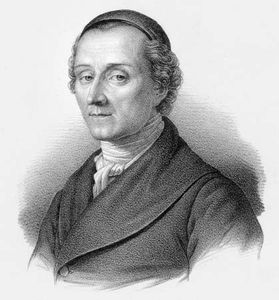Date of Birth: November 15, 1741
Zodiac Sign: Scorpio
Date of Death: January 2, 1801
Biography
Johann Kaspar Lavater was a Swiss theologian, writer, and philosopher, born on November 15, 1741, in Zürich, Switzerland. He is best known for his work in the field of physiognomy, which is the study of the relationship between a person’s outer appearance and their inner character. Lavater’s writings on this subject were highly influential during the late 18th and early 19th centuries. Lavater studied theology at the University of Zürich and was ordained as a pastor in 1769. His career as a theologian saw him serve as a minister in various parishes, eventually becoming the deacon of the St. Peter’s Church in Zürich. His theological work was characterized by his deep commitment to the principles of the Enlightenment, emphasizing reason, morality, and individual conscience. Apart from his theological work, Lavater was also a prolific writer. His most famous work, “Essays on Physiognomy,” was published between 1775 and 1778. The book became immensely popular and was translated into several languages. In these essays, Lavater proposed that one could discern a person’s character and personality by studying their facial features. Although modern science does not support his theories, his work was significant in shaping the fields of psychology and anthropology. Lavater was also known for his friendships with prominent figures of his time, including Johann Wolfgang von Goethe and the painter Henry Fuseli. He passed away on January 2, 1801, in Zürich, leaving behind a legacy that continues to be studied and debated by scholars.
5 Interesting Facts about Johann Kaspar Lavater
1. Lavater’s “Essays on Physiognomy” was one of the first works to link facial features with personality traits, influencing the development of early psychology.
2. He was a contemporary and friend of Johann Wolfgang von Goethe, who was initially intrigued by Lavater’s physiognomic theories.
3. Lavater’s work on physiognomy was illustrated by famous artists, including the Swiss painter Henry Fuseli.
4. He was a strong advocate for social reform and often spoke out against injustices and the mistreatment of the poor.
5. Lavater’s influence extended beyond theology and physiognomy; he was also involved in the literary and cultural movements of his time.
5 Most Interesting Quotes from Johann Kaspar Lavater
1. “He who loves others is constantly loved.”
2. “Mistrust the man who finds everything good, the man who finds everything evil, and still more the man who is indifferent to everything.”
3. “Action, looks, words, steps, form the alphabet by which you may spell character.”
4. “Not observation of a duty but liberty itself is the only true virtue.”
5. “The more honesty a man has, the less he affects the air of a saint.”
Highest Net Worth Achieved
Johann Kaspar Lavater did not accumulate significant wealth, as his primary focus was on his theological and philosophical work. Therefore, his net worth was modest and primarily comprised of his earnings from his pastoral duties and writings.
Children
Johann Kaspar Lavater and his wife, Anna Schinz, had eight children together. Details about their children’s lives are not extensively documented, but it is known that his family life was deeply important to him, and he sought to instill his values of morality and faith in his offspring.
Relevant Links
2. [Essays on Physiognomy – Full Text](https://archive.org/details/essaysonphysiogn01lava
3. [The Lavater Papers – A Collection of His Writings](https://www.jstor.org/stable/10.2307/602184
5. [Analysis of Lavater’s Physiognomy](https://www.ncbi.nlm.nih.gov/pmc/articles/PMC2736124/


